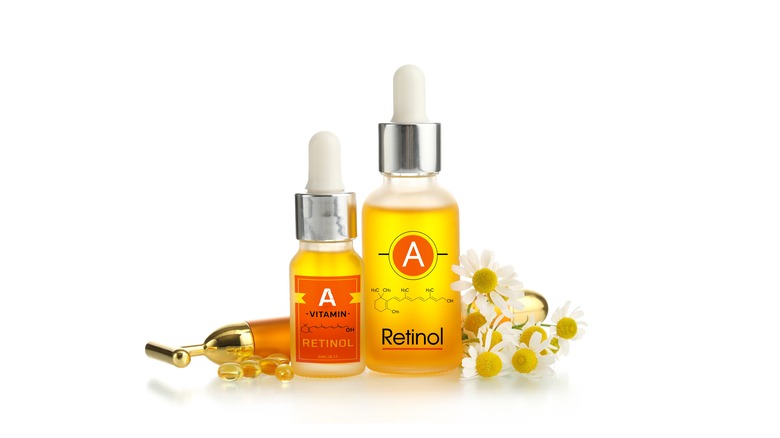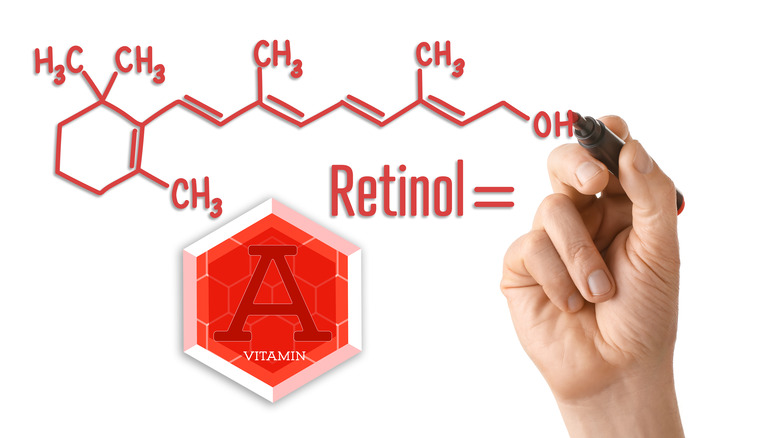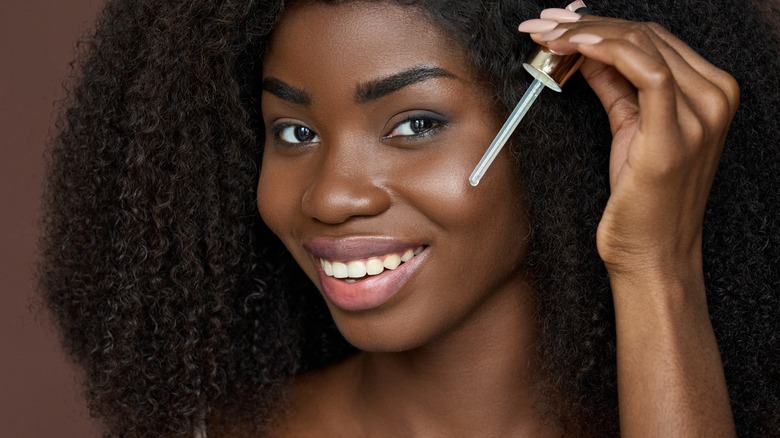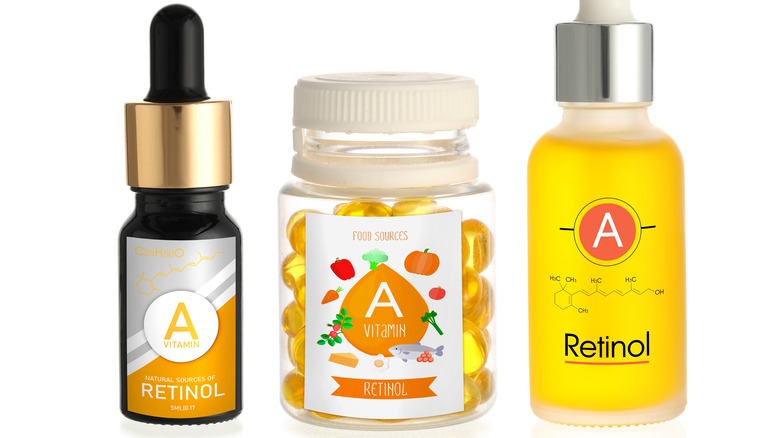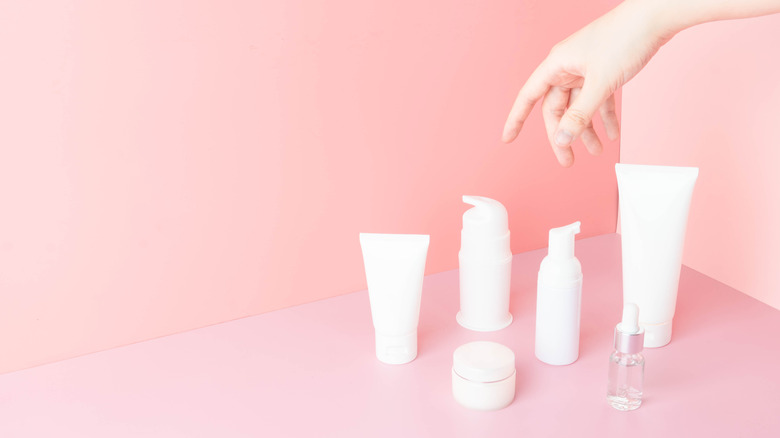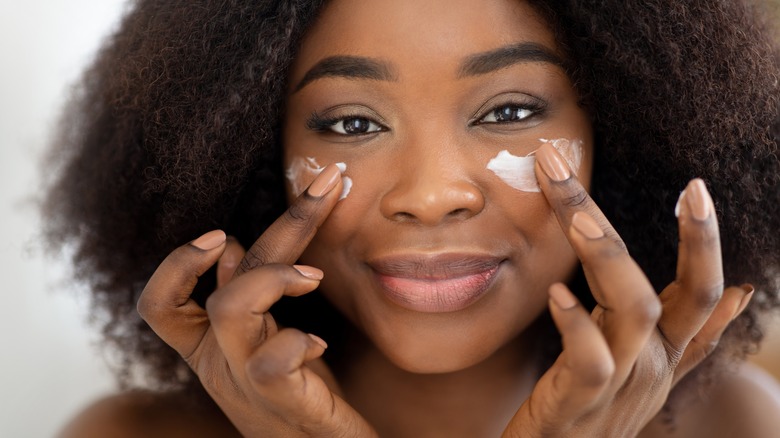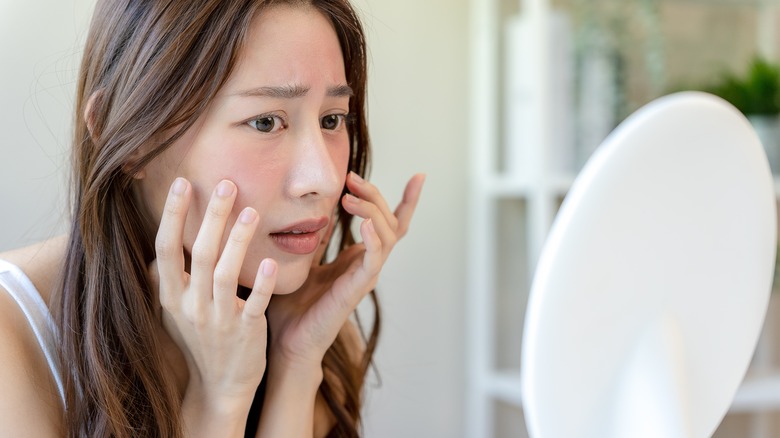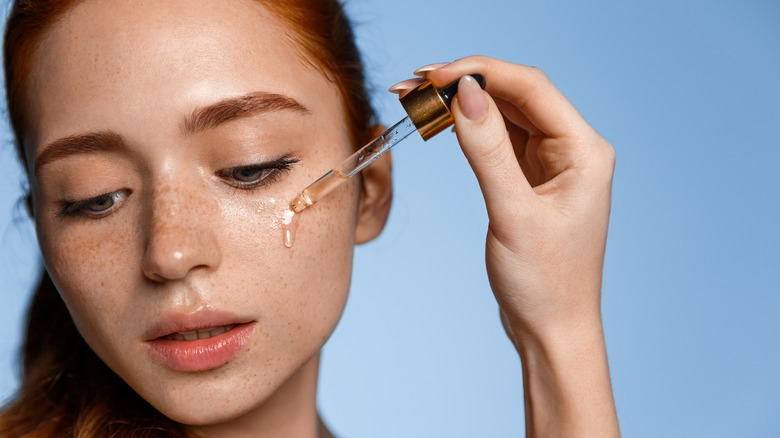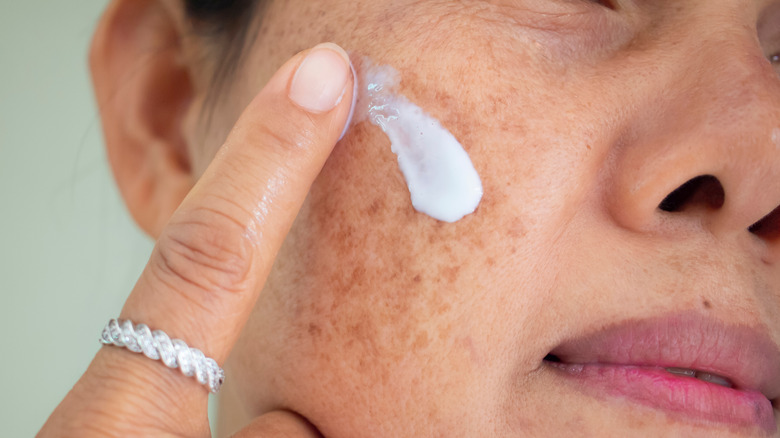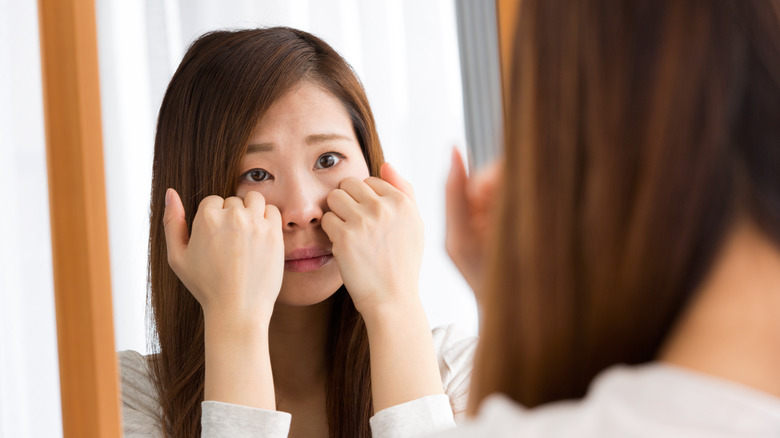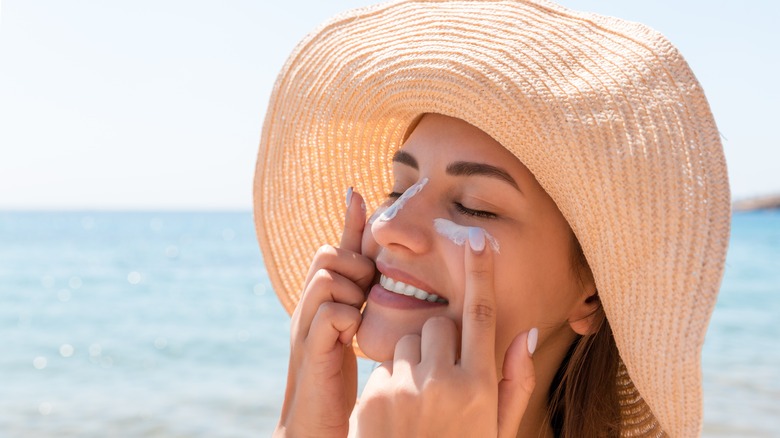Everything You Need To Know About Retinoids
Thanks to social media, you've probably heard about retinoids and that they're nothing short of miraculous when it comes to clearing acne and reducing the appearance of wrinkles. You've more than likely seen the after pictures of people with glowing, blemish-free complexions who claim that retinoids literally changed their skin almost overnight. The truth is that, yes, retinoids can completely change the game of skincare, but it's not a cure-all formula, and they most definitely won't change your skin overnight. They also may not work for everyone, unfortunately.
Using retinoids for the first time comes with some risks, and they're not kind to all skin types. While dermatologists can all agree on the benefits of retinoids, they also recommend people proceed with caution. "I wouldn't say you have to fear retinol, but you definitely have to treat it with respect," dermatologist Rajani Katta told Harper's Bazaar. "Retinol is a powerful ingredient with powerful benefits, which is why it has to be used with care," she added.
There's no arguing that retinoids have grown in popularity over the past couple of years, and these days they can be found in various forms of skincare, like creams and serums (via Today). However, being cautious when you first start using retinoids is crucial to ensure you protect your skin. Read on for everything you need to know about retinoids and how to ensure you keep your skin happy while using them.
What are retinoids, exactly?
First things first: Retinoids refer to compounds that are derived from vitamin A, and there are different types to choose from. Trifarotene, Tretinoin, Tazarotene, and Adapalene are all classified as retinoids, and dermatologists choose which of these to prescribe based on your skin concerns, board-certified dermatologist Sapna Palep told Marie Claire. You might have heard of Tretinoin, which is one of the most popular and effective retinoids. It's also the harshest on the skin, and Palep says she refrains from prescribing it for this very reason.
There are also retinoids you can buy over the counter, known as retinol. Retinol is much weaker than prescription retinoids, which also makes it gentler on the skin. "I consider it a gold standard in skincare and often explain it to my patients as something that sweeps away dead skin cells, clogged pores, and dull skin," dermatologist Francesca Fusco told Vogue. "It also functions like an antioxidant to help address free radical damage, which leads to visible signs of aging," dermatologist Whitney Bowe explains. Various skincare products incorporate retinol into their list of ingredients, since vitamin A is known for promoting skin cell renewal while also working to reduce the appearance of wrinkles (via Healthline). It's also commonly used to help those who struggle with acne. In short, retinoids — especially the types prescribed by dermatologists — can work magic for various skin conditions.
The difference between prescription retinoids and over-the-counter products
Now that you know exactly what retinoids are, you're probably wondering if you should get a prescription retinoid from the get-go or try an over-the-counter option first. What you end up choosing will depend on your skin type as well as the issues you're dealing with.
Board-certified dermatologist Sapna Palep told Marie Claire that the main difference between prescription and over-the-counter retinoids is how they affect the skin. The stronger retinoids can easily work their way into your skin receptors because they are already converted to retinoic acid. Over-the-counter retinoids like retinol need a little extra help. Your skin needs to convert retinol to retinoic acid before it can become effective, which means it takes longer to work than retinoids — but it's also gentler on the skin for this very reason.
It's no surprise, then, that weaker retinoids like retinol are typically used as the first line of defense when treating certain skin concerns, especially if a person already struggles with sensitive or dry skin. "Retinols are recommended for anyone with dry skin as they tend to be less drying and are frequently formulated with hydration ingredients," board-certified dermatologist Ramya Kollipara told Healthline. "Once you tolerate a gentle product, you can work up to a stronger product by alternating it over time," board-certified dermatologist Karyn Grossman says.
When should you start using retinoids?
You might think that you only need to start worrying about using retinoids sometime in the distant future when you reach your 40s or 50s, but the truth is that you can (and probably should) start using them way earlier than you think.
Many people consider their 30s the perfect age to start incorporating retinoids into their skincare routine, and while that's perfectly fine, more people are starting to use this skincare hero in their mid-20s to combat the first signs of aging, like dark marks and crows feet. "Your mid-twenties are a great time to start using retinol," Dr. Ellen Marmur told Vogue, adding, "Many patients who have used it for years swear by it." According to Glamour, most dermatologists agree that your mid-20s is the best time to start using retinoids. This can be especially helpful for people who struggle with skin conditions like acne or pigmentation.
How to choose the right retinoid
Choosing the right retinoid for your skin can feel like an impossible task with all the options that are out there, but according to SKNDoctor founder Dr. Ewoma, the secret is to start with the lowest concentration possible. "The general rule of thumb is to start with the lowest percentage, and then work your way up and make sure your skin becomes accustomed to it," she told Glamour. As previously mentioned, higher-concentration retinoids work faster and more effectively, but it'll require some patience to build up your skin's tolerance. "... you'll get to a point where you can't really see a difference with your skin, the product will still be working, but now it's time to move to something stronger to see the increased benefit," Dr. Ewoma says.
Typically, you'd want to start with a product that only contains 0.1 to 0.2% retinol, then gradually increase it to 1%, depending on how your skin responds. "Switch up strengths every two to four weeks when exfoliation and irritation are tolerable," Dr. Jason Emer suggested via Insider. It's also important to read the labels and figure out what the delivery method is. Products that use time-release, encapsulated, or drone technology can have a significant impact on how your skin responds to retinoids (via Glamour). Typically, you'll experience less irritation with these methods because they either deliver the retinol to your skin in very small amounts or work to protect your skin against retinol's harsher effects.
How to incorporate retinoids into your skincare routine
If you're ready to try retinoids for the ultimate skin transformation, there are a few things you need to know before incorporating them into your skincare routine. First of all, you only need a pea-sized amount of whatever product you're using, and you should apply it immediately after the cleansing step in your routine, board-certified dermatologist Sapna Palep told Marie Claire. She added that those who have extra sensitive skin and find that the retinoids cause irritation can opt to apply it after their moisturizer. She also cautions against following a complicated skincare routine when first using retinoids. "You can't use 500 other things at the same time," she warns, adding that a simple cleanser and quality moisturizer are the most important when you start using retinoids. "Once you're in a good place, you can get a little fancy and add other things," she says.
Last but not least, don't make the rookie mistake of applying retinoids every night; you're likely going to end up with red, angry skin, Palep says. Instead, take it very easy and only apply retinoids twice a week. As your skin gradually adjusts, you'll be able to apply it more frequently. You should also only use retinoids at night and wait until your face has dried completely before applying it to prevent any unwanted irritation, then follow up with a good moisturizer, board-certified dermatologist Ramya Kollipara told Healthline.
Do retinoids work with darker skin tones?
If you have dark skin and want to try retinoids, it would be a good idea to speak to your doctor or dermatologist before diving in head-first. While retinoids can irritate skin of any color, those with darker skin are more prone to it and are also at a higher risk of developing hyperpigmentation or dark spots, according to Healthline. This might seem a little ironic, given that retinoids are supposed to treat these conditions, but your dermatologist will be able to gauge whether they are a good fit for your skin. They will also help you to figure out which retinoid will work best for you and provide guidance as to how you should incorporate it into your skincare routine for optimal results.
In an article that dermatologist Wendy Roberts wrote for her website, she explains that the best retinoid products for darker skin are usually over-the-counter moisturizers, creams, and serums that contain retinol. These products are usually gentle enough for Black skin. "The key to finding over-the-counter retinol products that work well with Black skin is paying attention to the percentage of retinol present in the products," Roberts writes. "Anything that promises to be prescription strength is likely going to be too powerful for your skin." She adds that you should look for products that contain other moisturizing ingredients like rosehip and hyaluronic acid alongside the retinol content.
Retinoids don't always work for all skin types
We can all probably agree that retinoids have the potential to change the game of skincare, but unfortunately, they aren't a great fit for everyone, and according to some dermatologists, not everyone actually needs them. Speaking to Harper's Bazaar, facialist Nichola Joss explained that retinoids can be a great addition to any skincare routine, "but it is not essential for everyone."
Those with very sensitive skin often find that they simply can't tolerate even the weakest concentration of over-the-counter retinols — and if they only make your skin worse, there's no reason why you should keep torturing yourself. "If you have rosacea, psoriasis, or are eczema prone, then retinols are not really for you," dermatologist Paul Jarrod Frank tells the publication. If you have sensitive skin without the aforementioned issues, Frank says you can try very weak concentrations of retinol (as low as 0.025%) and see how your skin responds. If you don't have any adverse reactions, you can slowly build up your tolerance until your skin can handle higher concentrations. "I don't think anyone needs it," Frank explains, "but there are people that can benefit from it." Those people include individuals who want to minimize fine lines and wrinkles or often find themselves dealing with acne breakouts. However, it's still important you speak to a dermatologist before you start experimenting with retinoids. "It's a good idea to ask your dermatologist if retinol-based products are right for you and, if so, how often to use them," dermatologist Howard Murad says (via Harper's Bazaar).
Who shouldn't be using retinoids?
While retinoids are generally safe to use under the guidance of a doctor or dermatologist, they can be harmful when used during pregnancy. This is because too much vitamin A can cause a birth defect known as fetal retinoid syndrome (FRS), according to Healthline. Yes, even the retinoids you apply to your skin pose a risk since they are eventually absorbed into your bloodstream. Your doctor or dermatologist will typically recommend you stop using retinoids as soon as you start trying to become pregnant. It's unclear if retinoids can have an effect on the baby if you're breastfeeding, and to be safe, doctors advise you steer clear of retinoids while nursing.
Luckily, there are some alternative treatments you can use while retinoids are off-limits. You can replace them with products that contain hyaluronic acid, glycolic acid, or azelaic acid. Hyaluronic acid will keep your skin hydrated and take care of wrinkles, while glycolic acid serves as a chemical exfoliator that does a great job of keeping acne at bay. Azelaic acid will work to keep your skin free from inflammation while also curbing breakouts.
Retinoids can help treat acne
Retinoids do a great job of increasing skin cell renewal, which makes them the perfect treatment for those with acne-prone skin, as Dr. Marisa Garshick told Marie Claire. "... it works to prevent pores from becoming clogged, which makes it an effective option for acne and breakouts," she explains, adding that retinoids also work great for those who struggle with oily skin, thanks to their ability to curb sebum production. But keep in mind that it's not an instant fix. According to the Cleveland Clinic, you'll likely still have pimples popping up for a few months after you start using retinoids on your skin. In fact, your skin might very well get worse before it gets better — this is often referred to as purging — and you'll need to stick it out to see the final results. Once your skin is clear, Garshick recommends you continue using retinoids since they can help take care of any scarring your acne left behind (via Marie Claire). Continued use will also help prevent future acne flare-ups.
Retinoids can improve the appearance of fine lines and wrinkles
If you've been searching for a skincare product that can truly tackle wrinkles, retinoids are about to become your skin's new bestie. According to Dermstore, it's been proven that retinoids kick serious butt when it comes to reducing the signs of natural aging. Not only do they help smooth wrinkles and fine lines, but they also work great to repair any sun damage your skin might have suffered in the past.
These almost magical effects of retinoids occur because of the compound's ability to slow the rate at which the collagen in your skin breaks down, according to the Cleveland Clinic. "Retinol is the only applied topical agent that has been shown to actually stimulate collagen and plump the skin due to the formation of new blood vessels," dermatologist Mohiba Tareen told Insider. This results in improved elasticity — it's almost like turning back the clock. As we age, the collagen and elastin in our skin naturally start to dissipate. Skin cells don't renew as quickly as they did in our 20s, and the skin's dermis (the middle layer) gradually starts to become thinner, which means it no longer locks in moisture effectively. Retinoids solve almost all these problems, but it takes a couple of months of consistent use to see the effects.
Retinoids can help improve your skin tone and texture
Apart from getting rid of acne and reducing the appearance of fine lines and wrinkles, retinoids can also work wonders when you struggle with uneven skin tone and texture. If you dream of smooth, glowing skin on a daily basis, board-certified dermatologist Sapna Palep says retinoids might be the answer you seek (via Marie Claire). Getting older means that the skin's outer layer, known as the stratum corneum, becomes thicker. This leads to the dull and lifeless look many people try to avoid at all costs. Retinoids solve this problem by gradually working to thin the stratum corneum, revealing smooth, glowing skin. It also helps the skin to recover from environmental damage, Palep says. "Basically, sun damage, environmental damage, and free radicals don't allow our cells to turn over the proper way," she explained to Marie Claire, adding, "Retinoids help keep the cell turnover in the cycle that it should be."
Thanks to retinoids' ability to increase cell turnover, they can also take care of issues like hyperpigmentation, according to the Cleveland Clinic. In addition to that, retinoids also help reduce the size of your pores, preventing them from becoming clogged and growing larger as a result.
Retinoids can cause some side effects
As you might have guessed already, retinoids can cause some unwanted side effects. Since they're such potent compounds, your skin might have a reaction when you first introduce retinoids to your skincare routine.
You might notice that you have increased breakouts as well as red, dry, and flaky skin when you first start applying retinoids (via Today). While this might seem like a total dealbreaker, it's usually a result of using retinoids too much when you're just starting out. You need to be patient and give your skin time to adjust to this powerful ingredient. "It's very easy to overdose on retinol," Dr. Ewoma of SKNDoctor told Glamour. "When you do that, your skin just looks like sandpaper, and it might start peeling and flaking, or feel irritated and look red." She added that just because a product's label says it's safe to use daily doesn't mean your specific skin type is going to be happy with it. You need to pay attention to how your skin responds to a product and adjust usage accordingly. "If there is visible redness or peeling, use it once per week for a month then increase to twice per week and monitor the skin for irritation before increasing use," licensed esthetician Amanda von dem Hagen told Today.
Precautions to take when using retinoids
With great power comes great responsibility, and this saying is especially true when it comes to retinoids. While they do have the ability to deliver amazing results, you do have to take some precautions when you use them to ensure your skin stays happy and damage-free.
The most important thing you have to remember when using retinoids is that you should only use them at night, and always apply sunscreen during the day. "Retinol makes your skin more sensitive to UV rays, and sunlight decreases the efficacy of the product," dermatologist Whitney Bowe told Vogue. She recommends an SPF that offers UV protection of 30 or higher. With that said, you should also consider discontinuing the use of retinoids when you know you'll be spending a lot of time in the sun. "It should not be used during seasons or vacations when individuals will be spending extended time in direct sunlight," dermatologist Francesca Fusco warns (via Vogue). You should also skip retinoids when you plan on exfoliating your skin the following day, since this can cause irritation, Bowe says. The same goes for treatments like micro-needling and lasers. You should also keep in mind that retinoids don't play nice with all active skincare. Using chemical exfoliators like AHAs and BHAs alongside retinoids will cause irritation, Dr. Ewoma told Glamour, adding, "[W]hen combining serums, you need to make sure that they're complementary and address the same skin concern."

